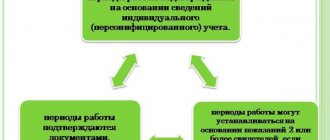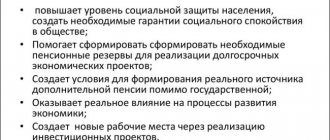Home / Labor Law / Labor Code / Work experience
Back
Published: 05/31/2016
Reading time: 6 min
0
9499
A pressing and controversial question is how years of study affect the registration of a pension.
Labor legislation changes regularly, some changes also affect the calculation of length of service.
Today, the opinions of legislators are such that in order to obtain a pension, you need to accumulate five years of insurance experience.
- Legislation on pensions
- Accounting for study periods
- Training and title of labor veteran
- Training in military schools and universities
- When do study periods still count?
Legislation on pensions
The main legal act regulating the calculation of pensions is Law No. 173 (on
pensions). It is under this legal act that the pension fund operates. According to the norm of Article 7 of the law, in order to receive a pension in old age, it is necessary that the official length of service accepted for registration be at least 5 years.
But what kind of experience? Continuous or general?
Today, the concept of “continuous service” has been excluded from the laws; only “insurance” is used. What is included in the insurance period by law? Let us turn to Article 10 of the law.
Experience is the period of a person’s activity on the territory of the Russian Federation (or Soviet Russia), when contributions to the pension fund were transferred from his income.
It is calculated in total, that is, all periods taken into account are added up.
Until recently, there was a rule according to which the following periods were included in the total length of service:
- training in schools;
- at retraining and retraining courses;
- in universities;
- in graduate school, doctoral studies.
Today such a rule does not apply. But with a caveat. It is possible to include some time periods in which training was combined with other circumstances.
The pension fund does not have the right to include periods of study in the length of service of doctors and teachers!
December 17, 2020 07:54
The Tomsk Region Branch of the Pension Fund receives daily questions from residents of the region related to changes in pension legislation.
One of them is whether periods of study in advanced training courses are included in the preferential length of service for doctors and teachers. Let us clarify that the appointment of an early old-age insurance pension is regulated by the norms of the Federal Law “On Insurance Pensions” and regulatory legal acts of the Government of the Russian Federation. Employees receive the right to early retirement in the case of special working conditions - difficult, harmful, dangerous, teachers - for teaching load (work with children).When assigning a preferential pension, there are strict restrictions - the length of service, in addition to the work itself, includes only sick leave, parental leave, if they began before October 6, 1992, and annual leave.
The time spent on advanced training courses cannot be included by Pension Fund employees in special length of service, because this period is not included in the Decree of the Government of the Russian Federation, which the Pension Fund of Russia bodies are obliged to follow. During the training period, the employee is not in special working conditions, does not bear psycho-emotional and other stresses that give the right to benefits.
Decisions to exclude study periods from preferential length of service are often appealed by citizens in court, but the practice of considering these cases is varied. The judge, compared to the Pension Fund of Russia, has broader powers in assessing documents, including indirect evidence, and therefore can make a positive decision, which will be executed by the Pension Fund. Please note that positive decisions in this situation are not always made by the court.
For the management of the Pension Fund of Russia as a law enforcement agency, the automatic inclusion of “disputed” periods in the relevant length of service will become possible only after changes are made to the legislation.
Due to the prevalence of this situation, especially for medical and teaching workers, the Russian Ministry of Labor has prepared a draft resolution of the Government of the Russian Federation, in which the special length of service includes periods of taking advanced training courses when the employee does not perform work that gives the right to early assignment of the specified old-age insurance pension , but he retains his place of work (position), average salary and pays insurance premiums for compulsory pension insurance. However, this position is not yet supported by the Ministry of Justice of the Russian Federation, so the issue continues to be discussed, and courses are still included in the length of service only by court decision.
Accounting for study periods
Exactly which periods are included in the length of service, that is, those that influence the registration of a pension, are indicated in Articles 10 and 11 of the law on pensions. These are the following periods:
- official work in Russia with a work book;
- entrepreneurship;
- work abroad.
In this case, it is mandatory that contributions be transferred to the Pension Fund (from income or voluntarily). If a person worked for an unscrupulous employer who, in order to save money, did not spend money on contributions and taxes, such periods may be excluded from the length of service.
But Article 11 lists periods not related to work activity, but included in the length of service:

- military service;
- sick leave;
- caring for a child up to one and a half years old (in total - no more than 4.5 years);
- registration at the labor exchange;
- illegal detention;
- caring for a disabled person of group 1 (also for a disabled child and pensioners over 80 years old);
- living with a military husband (or wife), if there are no jobs in the town (no more than 5 years are taken into account);
- living abroad with a husband (wife) consul, ambassador, trade representative, diplomatic representative (a period of no more than 5 years is also taken into account).
But any reason must be documented.
Hence the conclusion: if training was combined with the listed periods, then it is included in the insurance period.
Conditions for including studies in the length of service when granting a pension
Do you have the right to receive a pension, but the Pension Fund denies you this because you lack the required length of service?
It often happens that the length of service required by law (including special work) is short of just a few months or days, and the inclusion of studies in the length of service can ensure the assignment of a pension.
In order to correctly answer the question about the possibility of including studies in the length of service, you first need to decide which length of experience the training will be counted towards.
In pension legislation, length of service has several names and each of them has its own meaning:
1. Insurance experience – length of service that determines the right to a pension;
2. Work experience – length of service before January 1, 2002, which is one of the components of the insurance period, taken into account when calculating the amount of the pension;
3. Special (preferential) length of service – length of service that provides the right to early pension provision.
Taking this into account, the conditions for including periods of study in different types of work experience also differ. The determining factors are whether, at the time of study or at the time of registration of a pension, there were norms that established the right of a citizen to include study in a particular length of service. If the law or regulations do not provide for this, then even going to court on this issue will be ineffective.
Conditions for including studies in the insurance period for granting a pension
If the period of study falls on the period before December 31, 2001, then you can apply for inclusion in the insurance period.
It should be noted that studies during the specified period in vocational and secondary specialized educational institutions are subject to indisputable credit, but studies in higher education institutions are not always:
-before January 1, 1992, it was necessary that the training period be preceded by work (the duration of which does not matter) or service in the army or other units equivalent to the armed forces;
-after January 1, 1992, this requirement was canceled and therefore the period of training after this date is included in the insurance period without any additional conditions.
Thus, at present, studies will be counted towards retirement experience until the entire generation that received vocational education before January 1, 2002 retires.
Conditions for including studies in the total work experience
The total length of service includes all work experience up to January 1, 2002, and it has a direct impact on the size of your pension. In this regard, the period of training counted towards your work experience may change the level of your monthly pension benefit.
The pension is calculated using a formula that takes into account a number of indicators. Its size is determined mainly by the individual pension coefficient (IPC), which includes IPC1 (calculated for the period before January 1, 2002) and IPC2 (after this date). The first is calculated based on length of service and the amount of earnings, the second depends on the amount of insurance premiums transferred by your employer for you.
Today, the law provides for several options for calculating IPC1 (until January 1, 2002), the main of which are: 1) according to clause 3 of Article 30 of the Federal Law “On Labor Pensions in the Russian Federation”: this option involves calculating the pension, taking into account the ratio of the citizen’s earnings to the average salary in the country, multiplied by the length of service coefficient and the average salary in the country for the period from July 1 to September 30, 2001.
This option excludes the possibility of including studies in the length of service, but it is beneficial for those who had a high average salary (for any 60 months of continuous work experience before 2002, or for 24 months in 2001-2002).
2) according to clause 4 of the said norm: the calculation is made from average earnings multiplied by the length of service coefficient, with an increase by the compensation payment. This option provides the possibility of including studies in the work experience.
It is beneficial for those whose wages were lower than the national average in the above periods, but had extensive experience before 2002 (the lack of earnings is compensated by the experience). With this calculation option, crediting the period of study can increase the size of the pension.
Conditions for including studies in special experience for early retirement
There are special categories of citizens who are employed in jobs with hazardous working conditions, and therefore they have the right to receive an old-age insurance pension early, i.e. earlier than the generally established retirement age.
To do this, they need to develop a special (preferential length of service) of at least the duration prescribed by law.
In what cases does the law allow periods of study to be included in the preferential length of service?
To begin with, we note that study may not be included in any special experience.
So, it is not counted towards the northern experience, since this is not provided for by law.
Study is also not included in the length of service which, according to the new amendments made to the Federal Law “On Insurance Pensions” from January 1, 2019, makes it possible to retire 2 years earlier than the generally established one (42 years for men and 37 years for women) . Since the law determines that it includes only periods of work and other periods for which insurance contributions were made to the Pension Fund, in particular periods of temporary disability.
If you are applying for early retirement according to List No. 1 (for persons employed in underground work, in work with hazardous working conditions and in hot shops), according to List No. 2 (for persons employed in work with difficult working conditions) or, in connection with length of service in jobs with increased intensity and severity in the textile industry (only for women in the latter case), then you can increase your preferential length of service by including periods of study, subject to the following conditions:
— studies were no later than January 1, 1992;
— only periods of study in educational institutions of the vocational education system (in vocational, technical schools, vocational schools, etc.), as well as taking courses in personnel training, advanced training or retraining are counted;
— immediately after completion of training, work activity follows List No. 1, List No. 2.
Other forms of training are not included in the preferential length of service for the above pensions.
When assigning an early pension according to Lists No. 1 or No. 2, it is also allowed to take into account the period of “apprenticeship” in the preferential length of service, when training was carried out on the job (at the place of future work according to List No. 1, List No. 2), if the List indicates production and workshops without listing professions and positions. For example: “all workers, engineers and employees employed full-time in underground work.”
If you apply for a pedagogical pension, then periods of study are included in the special experience of teachers, but subject to the following conditions:
- studied at pedagogical educational institutions and universities before October 1, 1993;
— the duration of study, which is included in the preferential length of service, cannot exceed 1/3 of the teaching experience;
- before and after studying, teaching work was carried out, which provided the right to an early pedagogical pension.
For persons applying for early pensions in connection with teaching or medical activities, it is possible to include periods of completion of advanced training courses in the preferential length of service.
Judicial practice, to date, on this issue has clearly developed in favor of citizens. The courts proceed from the fact that advanced training courses are mandatory for teaching and medical workers, this is part of their professional activity, and during the period of training, workers retain their place of work and average earnings, i.e. deductions of insurance premiums are made.
What to do?
If the Pension Fund does not include your studies in your length of service, and this is necessary for granting a pension, then you need to go to court to resolve this issue. This situation is serious, deserving of great attention, but not desperate!
To do this, you need to contact a specialist involved in pension disputes. As in any business, a professional must do the work, otherwise even the most reasonable undertakings can fail.
I am a lawyer, that is, a practicing lawyer with extensive experience in handling such disputes in court.
Having studied your situation and familiarized yourself with the documents you have, I will be able to give you full advice on your specific case.
Having reliable information, you will be able to act wisely and get out of the difficulty in the most rational way.
Everyone can use the help of a pension lawyer, regardless of their financial component. For example, you can limit yourself to one or several consultations with a professional, or you can, by concluding an agreement for a full range of legal services, guarantee yourself reliable and qualified assistance from a specialist in court, increasing your chances many times over.
WOULD YOU WANT TO LEARN ABOUT THE FEEDABILITY OF CONTACTING A LAWYER - CLICK HERE!
Training and title of labor veteran
Article 7 of the law on veterans specifies the grounds for conferring the title of labor veteran. Thus, a citizen is recognized as a labor veteran if:

- have a “Veteran of Labor” certificate or awards in the labor field (including Soviet-style ones);
- the man has 40 years of insurance experience, and the woman 35.
Again, periods of training are not included in the length of service. However, there is a caveat: the procedure for assigning such a title can be changed by the laws of regional authorities (regional, regional, city halls of Moscow and St. Petersburg).
According to the norms of regional laws, periods of training may well be counted towards length of service.
Training in military schools and universities
Although cadets and cadets are recognized as military personnel, military training, according to the law on pensions, is not included in the insurance period. The pension reform has led to the fact that only those who can prove the receipt of contributions to the Pension Fund from their income for 5 years (in total) can count on a pension.
Duration of paid leave according to the Labor Code of the Russian Federation - find out more! Got sick on vacation? Do you want to apply for sick leave? Read here how to do it correctly.
You can find out the competent advice and information you need on calculating maternity benefits in our article.









